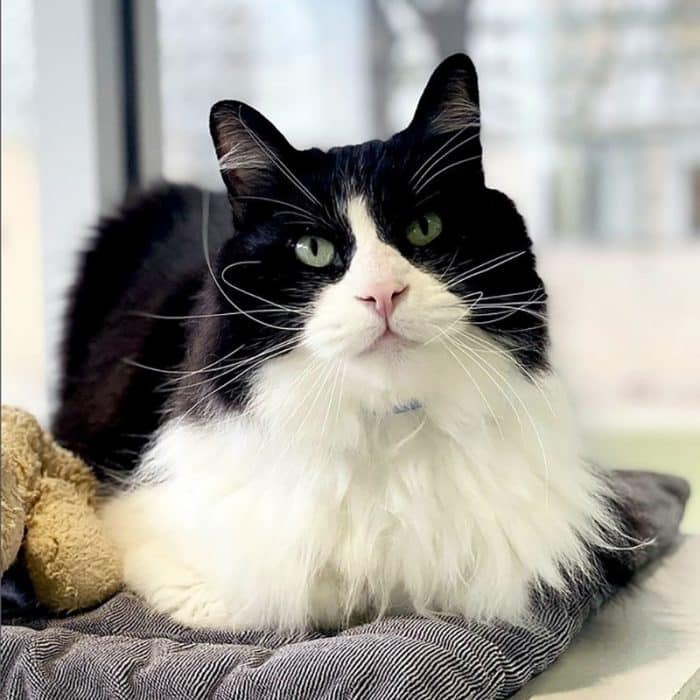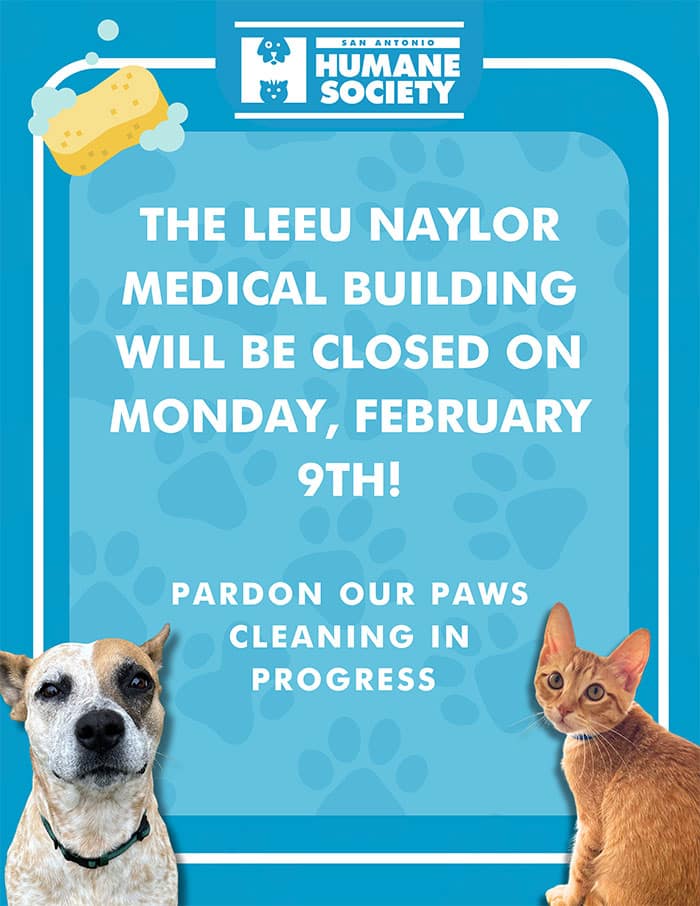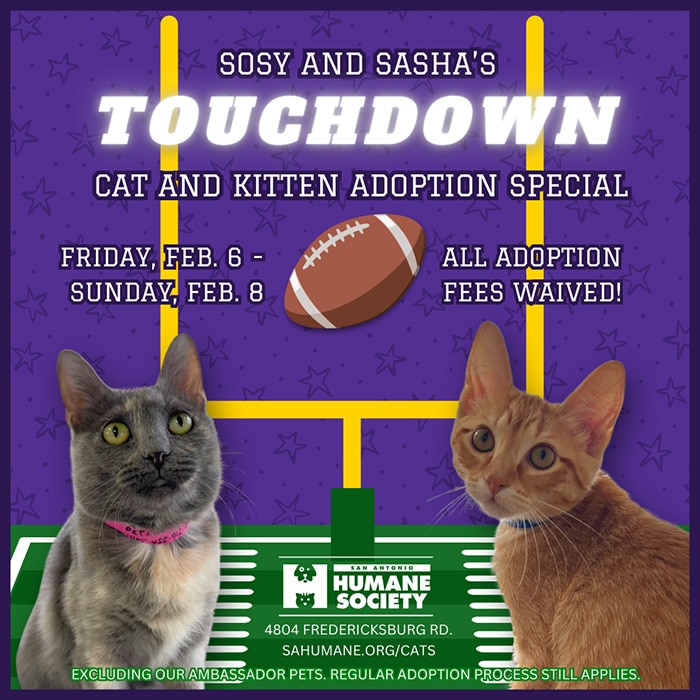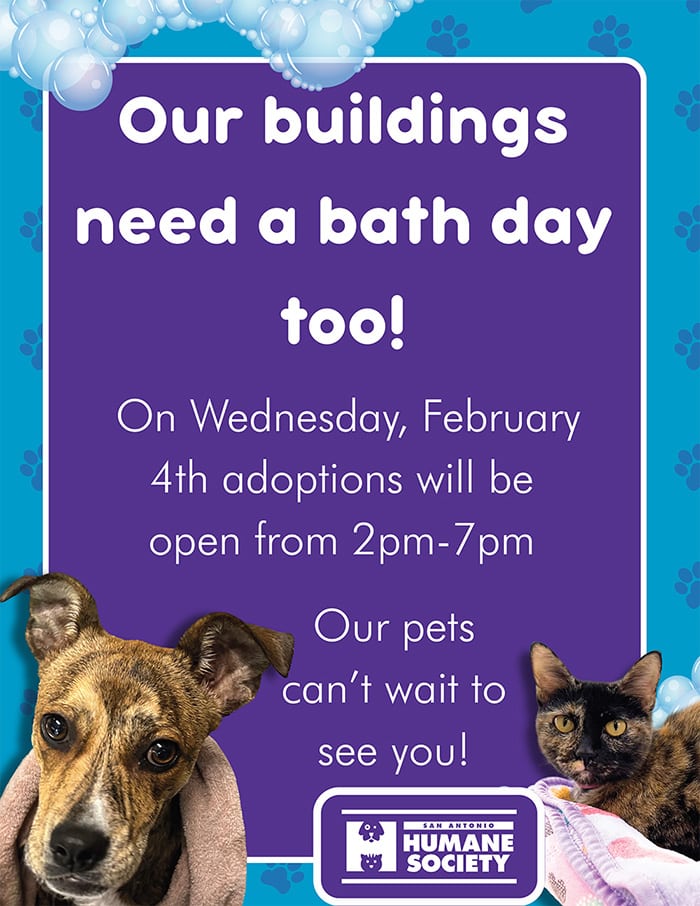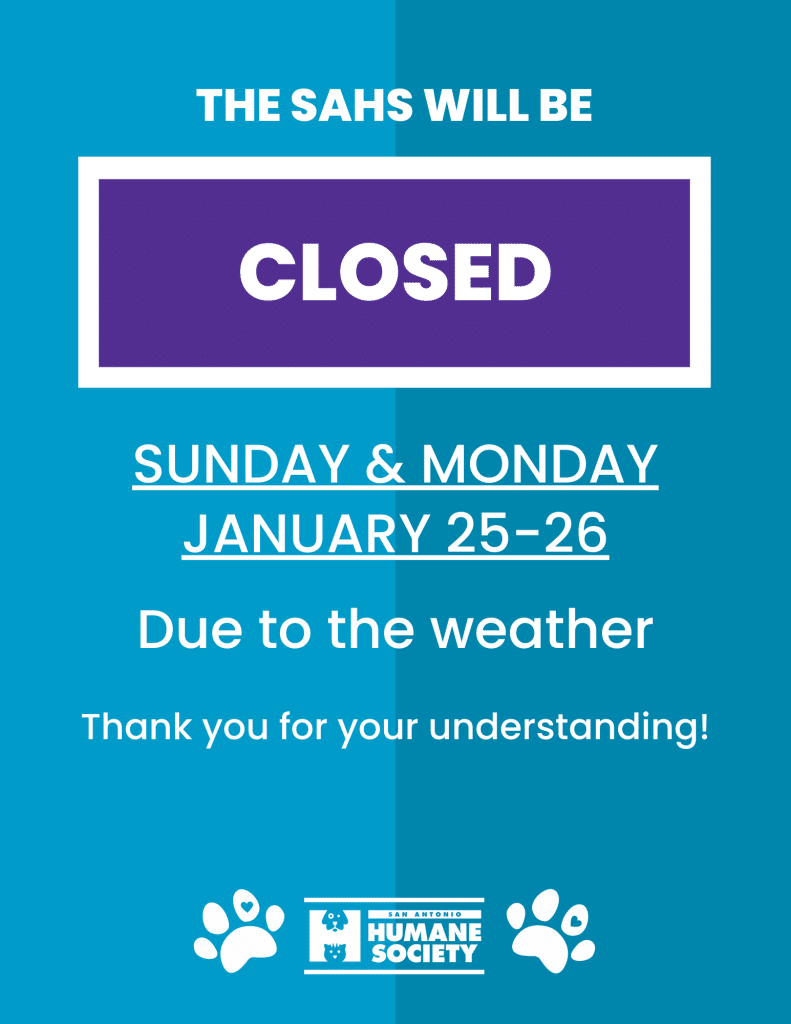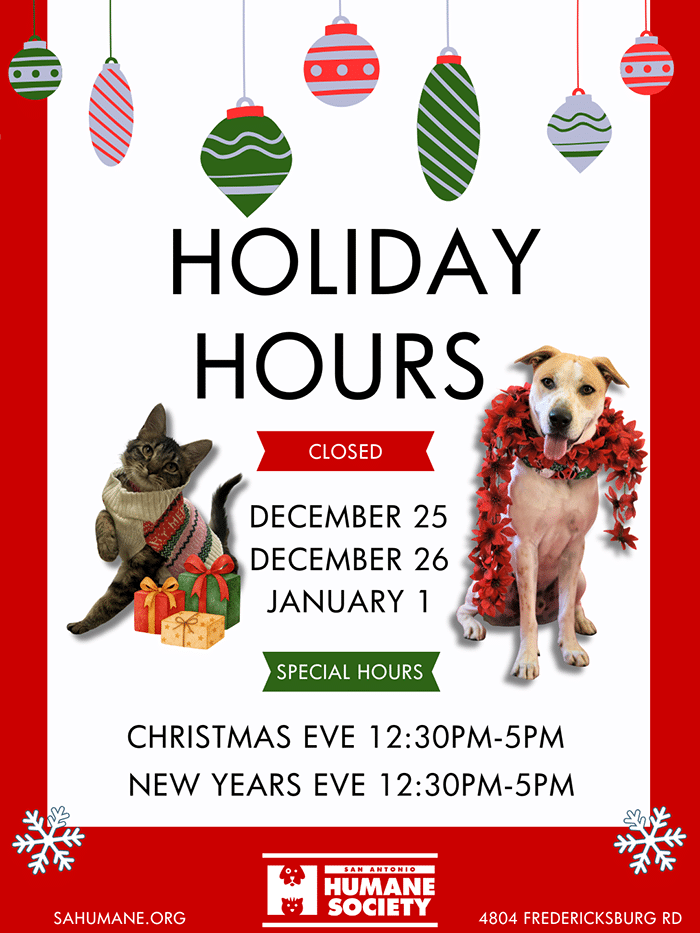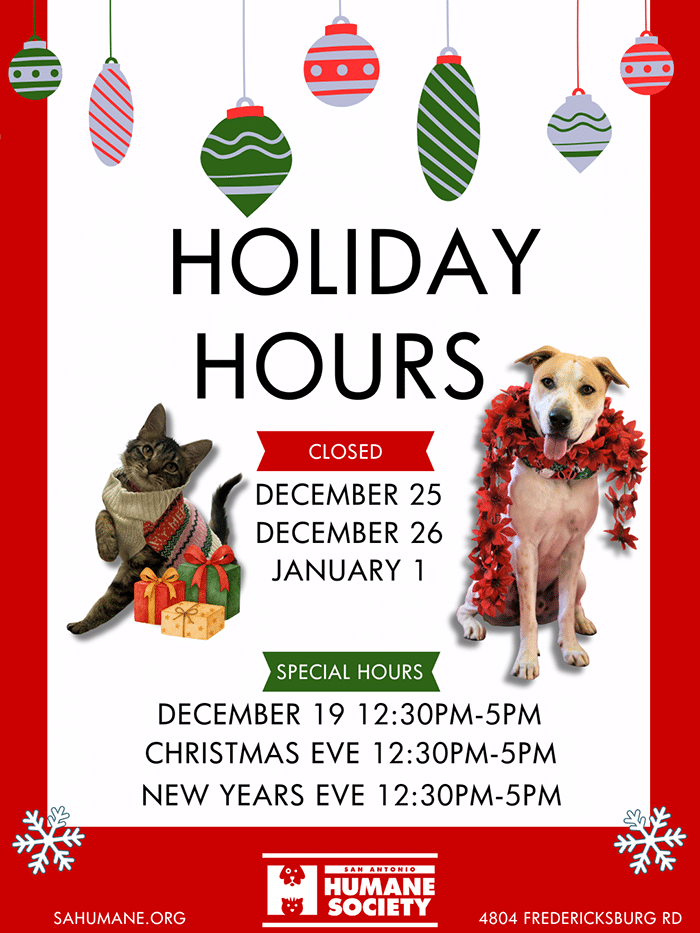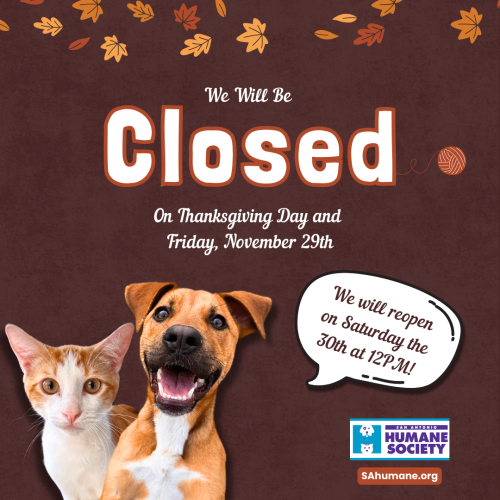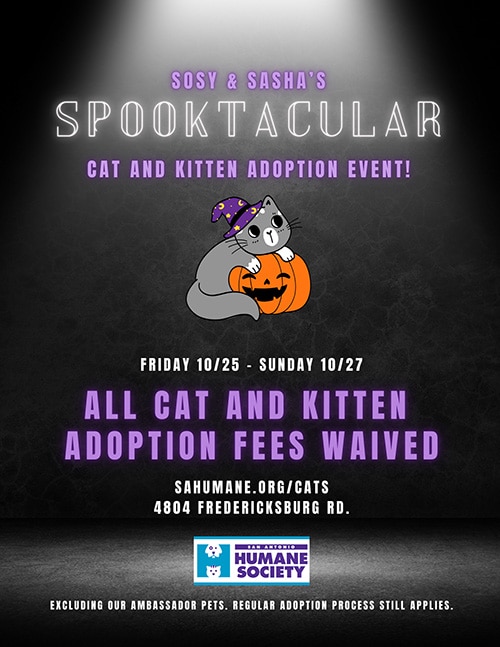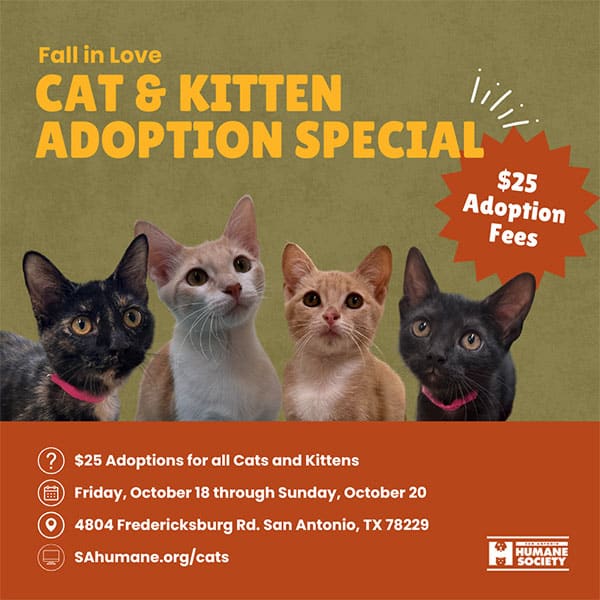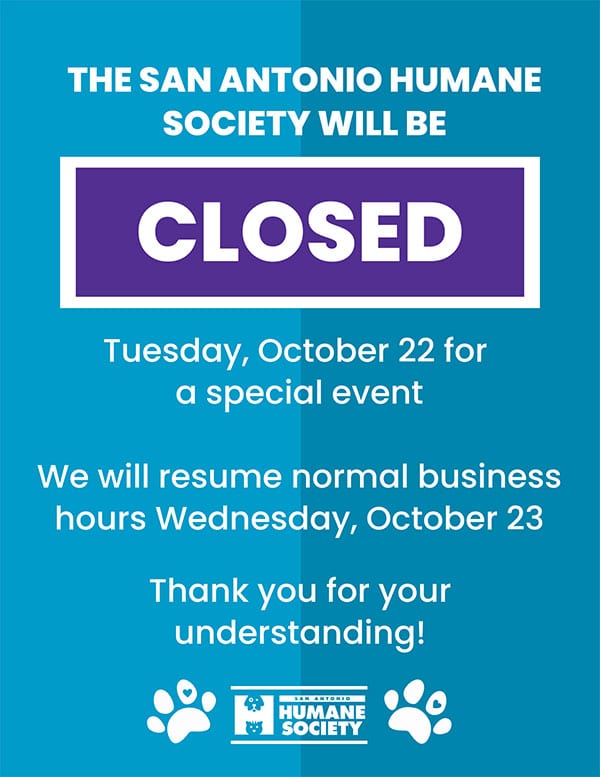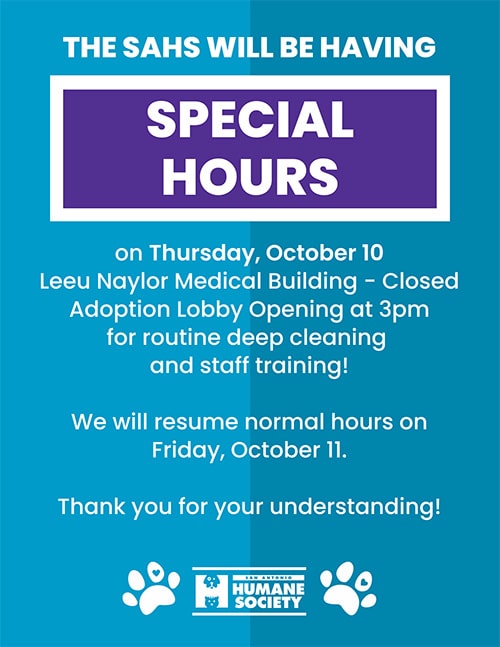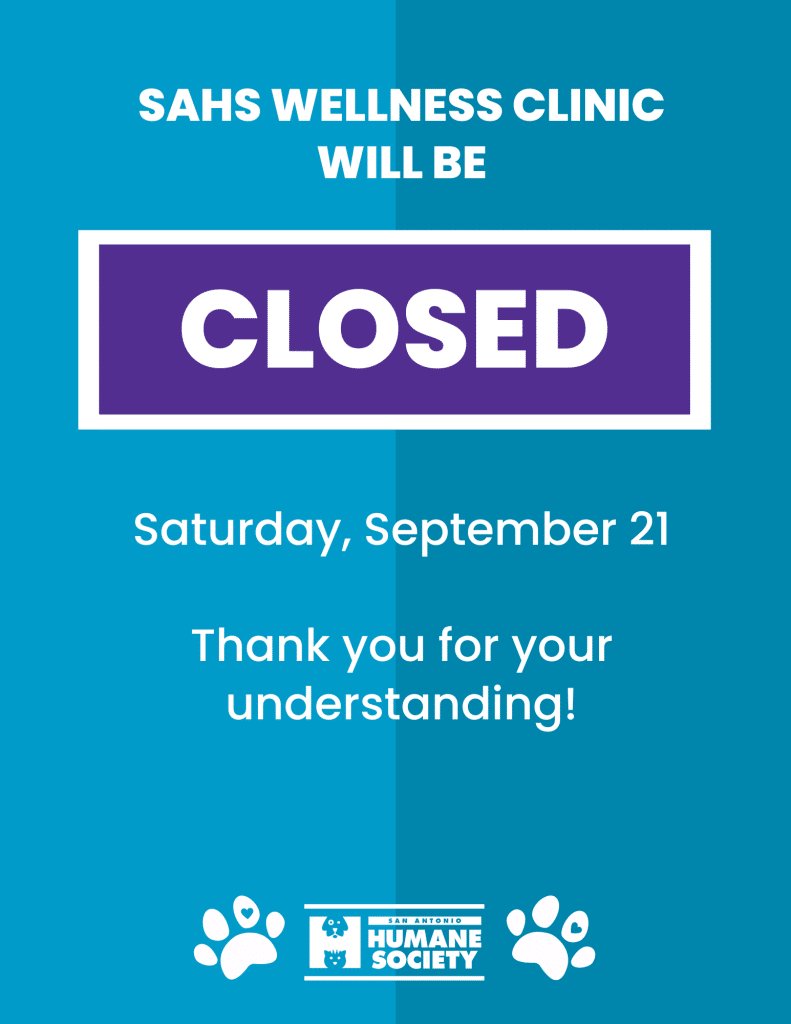Spay and Neuter Clinic
Latest Updates
- Please be patient with us as we work to decrease client wait time with a new check-in system
- NO feral cats surgery dates: January 26, February 9
- Our spay/neuter appointments for the month of February will be released on Monday, January 26 around 9am. See below to schedule. If no available appointments are showing after that date/time it means that we are fully booked. We only open up appointments for one month at a time.
- Dates when S/N appointments will be made available (around 9am): Monday: January 26, February 23, March 23, April 27 (Tuesday), May 25, June 22, July 27, August 24, September 21, October 26, November 23, December 28
- If your pet is a brachycephalic breed (ex, French Bulldog, English Bulldog, Pug, Boston, Persian, Himalayan, etc), they are considered a high-risk surgery due to their potential airway complications. These surgeries will incur an additional charge ($35 for dogs, $20 for cats) due to technician support and medications. There is a limit of 5 brachycephalic pets per day, and you may be contacted to reschedule.
- Currently we are only doing feral cat spay/neuter surgeries (limit is 10 feral cats (TOTAL) per day (Monday-Friday) until further notice) at our shelter location (4804 Fredericksburg Road, at our Leeu Naylor Medical Building next to the shelter.)
Low-Cost Spay/Neuter Information
Thank you for your interest in having your dog or cat spayed/neutered by the SAHS! This surgery helps decrease the overwhelming number of unwanted pets in our city and improves your pet’s chances for a longer, healthier life. Spay/neuter services are available to the public by appointment only.
Spay & Neuter Fees
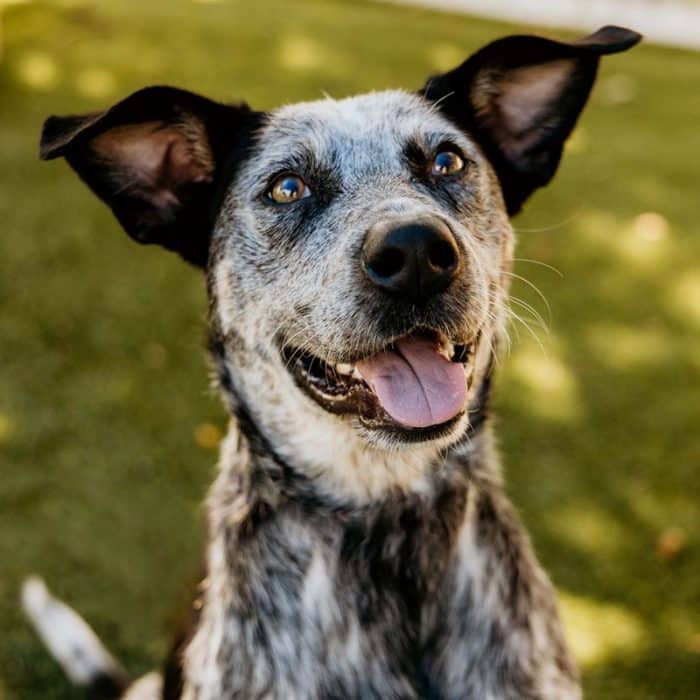
Is My Pet Eligible?
Cats
Male: $71.00
Female: $79.00
*Feral: $71.00
Female Dogs (Spay)
2-20 pounds: $104.00
21-40 pounds: $134.00
41-60 pounds: $164.00
61-80 pounds: $194.00
81-100 pounds: $225.00
Male Dogs (Neuter)
2-20 pounds: $98.00
21-40 pounds: $127.00
41-60 pounds: $153.00
61-80 pounds: $182.00
81-100 pounds: $208.00
- FIV/FeLV Combo test (cats)
- Heartworm test (dogs)
- Unattached dewclaw removal (dogs)
- Feral Cat ear tip (required for all feral cats brought in for spay/neuter): No Cost
- Microchip (includes registration)
- Rabies vaccine
- DAPP
- FVRCP
- Heartworm 4DX test (also tests for tick borne diseases)
- Capstar (required for any animal with multiple fleas on intake)
- E-collar (after surgery cone)
- Pain Medication
- E-collar AND Pain Medication combo
Schedule Your Pet’s Appointment
Please follow the links below to schedule your pet’s appointment and enter all information as accurately as possible. Availability is based on staff levels as well as weight, species, and sex of the animal.
If you can’t find an available time (if no appointments show, it means that we are currently fully booked), please check back at a later time for future scheduling opportunities. We will open future months for appointment scheduling once availability is determined (we only open up appointments for one month at a time). Payment is required to schedule an appointment.
If you have a coupon code, you will enter it during the checkout process when you schedule.
For the “Zip Code Grant Information & Eligibility” please scroll down the page.
Please also take note of other shelters in and around San Antonio that offers spay/neuter services.
What to Expect at Your Appointment
Please be patient with us as we work to decrease client wait time with a new check-in system.
Check-in begins at your appointment time (see your appointment confirmation). SAHS surgery staff will announce the pick-up time for your pet during check-in. If payment was not made online when scheduling your appointment, it will be due at check-in. Please note: a 1- to 1.5-hour wait during check-in is possible during our busiest days.
Rabies vaccine and proof of vaccination is required by Texas state law for any animal 16 weeks of age or older, and can be administered as early as 12 weeks of age. A rabies certificate which must include your dog or cat’s name, descriptions, administer date, and veterinarian signature, must be presented at check-in. If proof of current rabies vaccine is not available, SAHS staff will administer the rabies vaccine to your pet at the time of surgery for an additional cost.
IMPORTANT: The zip code grant requires proof of residency living in a qualified zip code within city limits. If you reside in an independent municipality (ex: Leon Valley, Helotes, Castle Hills… etc.), you do not qualify for the grant. To check whether you reside within city limits click here: https://maps.bexar.org/community/
Zip Code Recipients Surgical Deposit: There will be a $16.50 surgical deposit that is applied to my pet’s zip code grant appointment. The surgical deposit is due at the time of scheduling to secure my pet’s appointment. The $16.50 can be applied to my pet’s pain medication or e-collar, or towards any other services received.
Zip Code Recipients for cancellations/refunds: There must be a 48-hour advance notice for a full refund. Refunds will go back to the original card used during booking. Refunds will not be given in the event of a no-show. Surgical deposits are also non-transferable.
If you are unable to prove that you live in a qualifying zip code, you will be charged the full price of surgery during check-in. You must use the code: ZIPFY2026 through the zip code calendar if you are trying to utilize the grant. If you do not use the code, then you will be charged full price and a refund cannot be given.
Review available zip codes. Only pet owners who reside in the following zip codes (within city limits) will be eligible for free sterilizations: 78201, 78202, 78203, 78204, 78205, 78207, 78208, 78210, 78211, 78213, 78214, 78218, 78219, 78220, 78221, 78222, 78223, 78224, 78225, 78226, 78227, 78228, 78229, 78235, 78237, 78238, 78242, 78264
The City of San Antonio Animal Care Services has generously provided funds for FREE spay/neuter surgeries at the San Antonio Humane Society (4804 Fredericksburg Rd.) for those residing in the zip codes posted on the review link above. Rabies vaccines are free at the time of the spay/neuter to those who qualify for the zip code grant.
If your pet experiences complications after pre-medication or induction, the veterinarians may elect to not perform surgery. If your pet is sedated or induced but does not receive surgery, this pet’s services do not qualify under the zip code grant and you will be charged a fee of $15 to cover the cost of medications. All vaccinations (including required rabies) administered will also result in a fee.
Any additional products/services (such as, but not limited to: additional vaccines, comfort packages, microchips, crypt neuter, gravid spay…etc) are our regular price. Reparative surgeries are also to be paid at regular price by the customer.
Appointments are limited. Limit 5 per household, per calendar year.
Scheduling:
Use code: ZIPFY2026
This opportunity requires documentation for proof of zip code (eg, driver’s license or utility bill), please bring it with you when you drop off the animal on surgery day.
For questions or assistance with scheduling an appointment, email [email protected] or call 210-424-7595.
For cancellations/refunds: There must be 48 hours advance notice for a full refund. Refunds will go back to the original card used during booking. Please note that special promotion surgery costs will not be refunded even in the event of 48-hour notice.
For rescheduling: There must be a 48-hour advance notice prior to your pet’s appointment to be rescheduled. Rescheduling is not a guarantee and will be canceled if there is no availability.
Feral Cat Spay/Neuter Program
The limit is 10 feral cats per day (TOTAL) (Monday-Friday) unless otherwise posted. Also, see the top of the page for dates with NO feral cat surgeries.
All feral trap doors must be secured with either a carabiner or pipe cleaner. Zip ties will not be accepted.
The SAHS will reserve the right to charge full price to any feral cat coming in with a collar.
There is a 10 feral cat limit, and no more than 3 feral cats per person, Monday – Friday at SAHS 4804 Fredericksburg Rd (at our Leeu Naylor Medical Building next to the shelter.).
San Antonio Humane Society (4804 Fredericksburg Rd, at our new Leeu Naylor Medical Building next to the shelter.): Monday – Friday at 7:15 am
Feral cats check-in form (please fill out)
Feral cats must be brought in at check-in (7:15 am) in an approved trap (All feral traps doors must be secured with either a carabiner or pipe cleaner. Zip ties will not be accepted.). All feral cats will receive a permanent green tattoo on their abdomen as well as an ear tip to designate sterilized status. We cannot accept feral cats for surgery if they are not in an approved feral cat trap as they are a danger to themselves and our staff. If you have not attended a feral cat trapping training class, please do not attempt to trap feral cats on your own or bring them in an inappropriate carrier. This only creates added stress to the cat, and we will not be able to perform surgery. Learn more info about local feral cat groups/training classes.
Spay and Neuter Frequently Asked Questions
Are you a 501(c)(3) organization looking to partner with the San Antonio Humane Society (SAHS)? For more information, please contact the Medical Support Supervisor at [email protected]
Spaying is the common name for a procedure called an “ovariohysterectomy”. This is an abdominal surgery in which the uterus and ovaries are removed from the female’s body. This procedure will make her incapable of reproduction and is the common practice to sterilize females.
Neutering is the common name for a procedure called “an orchiectomy”. This is an externeral surgery and does not commonly enter the abdominal cavity although is the case of some cryptorchids with an abdominally retained testicle it might. In this procedure both testicles are removed from the male’s body making him sterile and removing him from the gene pool.
It is a surgical procedure so some pain and inflammation is common. The surgery itself is done with the pet asleep under general anesthesia where they cannot feel a thing. Pain medicines are given prior to and after surgery that can give the pet pain relief for up to 36hrs after surgery.
It is common for a pet’s metabolism to slow down a bit after surgery. It is possible, however, to maintain your pet at a healthy body weight by adjusting the pet’s food intake. It is possible to keep your pet healthy regardless of their reproductive status.
Surgery should not alter your pet’s friendly or exuberant behavior. At most you should see a decrease in undesirable behaviors like house marking, aggression, escape/roaming and courting behaviors especially in male dogs.
Animals are remarkable in their ability to recover from major surgery. This same set of surgeries, when done in humans, can put someone out of work for 6wks or more. For our pets, recovery sees them back to eating and acting almost normally within 48-72hrs and totally back to their normal self in 5 days. Full healing for the incision and surgical sites can take one week for the superficial layers to several months for the deeper tissue. Complications can postpone healing, of course.
Your pet will receive a Body Condition Score on a scale of 1-9. Pets that are found to be 8-9/9 are considered Obese and will be denied surgery due to the increased risk. Pets that are found to be 6-7/9 are considered Overweight and may incur an additional charge due to the potential increased surgical time, additional ligatures, and increased risk of surgery.
For more information & graphic examples please see:
Our prices depends on the size of your pet and if it’s a dog or cat. See above (check-in form) for our pricing and services offered at the time of the spay/neuter. Please note that there is an extra fee for obese pets, if c-section is needed, crypt procedures etc.
Schedule online, see all schedule options above on this page. If no appointments show, it means that we are fully booked. Please note that we only open up appointments one month at a time. You find the release dates at the top of this page.
If you require assistance with scheduling or if you do not have access to a computer, please call 210-424-7595.
If you scheduled your appointment online, you can cancel/reschedule through your confirmation/reminder emails. There’s a link to reschedule in the email.
For cancellations/refunds: There must be 48 hours advance notice for a full refund. Refunds will go back to the original card used during booking. Please note that special promotion surgery costs will not be refunded even in the event of 48-hour notice.
For rescheduling: There must be a 48-hour advance notice prior to your pet’s appointment to be rescheduled. Rescheduling is not a guarantee and will be canceled if there is no availability.
Check-in: Thank you for booking with us! Please note that the San Antonio Humane Society operates as a high-volume spay/neuter clinic. It is important to arrive at your pet’s scheduled check-in time. Additionally, there will be other clients/pets scheduled at the same check-in time. Please keep in mind that admission paperwork and a physical examination of every patient must be completed before leaving your pet for surgery. Please be advised that the surgery check-in process may take several hours to complete.
Pick-up time is typically between the hours of 3.30pm-4.30pm unless otherwise stated (a surgery technician will give the client the pick-up time during check-in, the exact pick-up time depends on the number of surgeries performed on any given day). Please arrive before 5pm to avoid a late fee. Expected wait time could be a few hours, this depends on the number of surgeries performed that day.
Payment for additional services (see check-in form) will be taken at pick-up/check-out.
RECHECK HOURS
San Antonio Humane Society, 4804 Fredericksburg Rd.
11 am to 3 pm Monday – Friday
For all post-operational instructions click here!
This is an old wives tale. It was once believed that allowing a female animal to have a litter before being spayed was good for her body. Studies have since been done that indicate that the greater the number of litters and heat cycles that a female dog goes through before she is spayed substantially increases her risk of severe health problems like mammary cancer and pyometra. Having a female dog spayed prior to her first birthday can substantially increase her lifespan.
Different vets recommend different ages for spay and neuter. Here at the San Antonio Humane Society we have successfully practiced “pediatric alters” meaning that we routinely neuter and spay animals at 8 weeks. Our guidelines are that your pet must be 8 weeks and 2 pounds or more to be fixed here. We believe that the surgery is easier on the pet at this time when they are still small and resilient both mentally and physically. We also believe that it helps to create a pet who is never distracted by reproduction hormones and can have a stronger lasting bond with their owners. Lastly, it prevents accidental unwanted litters by dogs/cats who reach maturity before the norm and before their owners realize it they have a puppy having puppies!
A pregnant animal can be spayed at the discretion of the veterinarian performing the surgery. There are greater anesthetic risks as well as risk of incision complications, however, this surgery has been performed regularly here at the San Antonio Humane Society with great success and is often better for the female in the long run. Rarely, a dog may have a “pseudocyesis” experience after surgery meaning that, due to the hormones involved, they actually feel they have had a litter and might experience lactation, nesting, and mothering (which can include children, other family pets, or inanimate objects.)
A female can be “in heat” or estrus during the surgical procedure. This is done routinely, especially in cats, and while the procedure can be more tedious for the veterinarian there is often no additional risk to the patient. Extra blood loss or possible vaginal/uterine infection can be a complication.
This is a commonly debated question in veterinary medicine. While some veterinarians do believe that a single heat cycle releases hormones into the blood stream that are important for maturation of the body, there has been little scientific evidence to suggest that animals neutered before a heat cycle are negatively impacted. We feel that the risks of waiting for sexual maturity far outweigh the benefits.
Veterinarians all have different scientific logic behind their protocols. Some veterinarians have selected 6 months for the above listed rationale. Others believe that an older puppy is stronger and has had a chance to develop immunity to the viruses. These bits of logic are reasonable for most pets but we feel strongly that since pediatric surgeries are not harmful to the pet at all, they should be recommended in most cases.
There is ALWAYS a licensed veterinarian performing the surgery. On rare occasion a fourth year veterinary student who is months from becoming a veterinarian will be supervised directly by a licensed vet in accordance with state law. Only exemplary veterinary students are allowed to perform surgery under the watchful eye of an experienced veterinarian.
All surgical procedures are performed with high quality veterinary care including surgical plane anesthesia. This means all pets are completely “asleep” for the duration of the procedure.
Most pets are not sent home with pain meds for the owner to administer. HOWEVER, ALL pets are given both presurgical pain medication and a post surgical long term pain medicine injection.
Please never give your pet over the counter medication without consulting a veterinarian. Common medicines like Tylenol can be bad for dogs and deadly for cats.
Payment:
– SAFCC grant: $25, included: spay/neuter surgery, rabies & fvrcp vaccine, and ear-tip. Only people who have attended the in-person or online SAFCC TNR class can use this.
– Zipcode grant: FREE, includes: spay/neuter surgery, rabies vaccine, and ear-tip. Depending on your zipcode/location, you can use up to 5 zipcode grant uses PER RESIDENCE
Traps
– Trucatch trap is the only accepted trap we take for TNR.
– Rentals.
– Securing with pipe cleaners & labeling.
Procedure
– Normally, we accept up to 15 feral cats for surgery intake (10 public, 5 ACS appointments) from Monday – Friday starting at 7:00 AM.
– It is recommended to come prior to 7:00 AM since there is no way to predict how many people with feral cats will show up.
– The cat must be in a trucatch trap with pipe cleaners or carabiners securing the ends, the temporary name for the cat (or A number if ACS) written on tape placed on top of the trap and on top of the towel that is recommended to cover the trap. No bedsheets or obscenely long/large pieces of fabric that can get tangled or stuck.
– Once inside the building, please place your cat on the appropriate spot marked on the floor. Our staff will check your paperwork, cat, trap, and take payment before giving a pick-up time (normally 4:30, no later than 5:00 PM or there will be a late fee.
– Please be aware that feral cat surgeries are normally the last surgeries done by our staff. If you arrive at 4:30 and your cat is not ready yet, please alert staff so we can check to see if your cat is still recovering from surgery. If paperwork hasn’t been given to you yet, please ask staff their progress on it. If you have to leave, we can always send it to an email before leaving at the end of the day. We can also look at surgery paperwork and let you know if your cat was pregnant or had any additional notes to look out for.
Watch Sean & Claudia Elliott talk about spaying/neutering.


